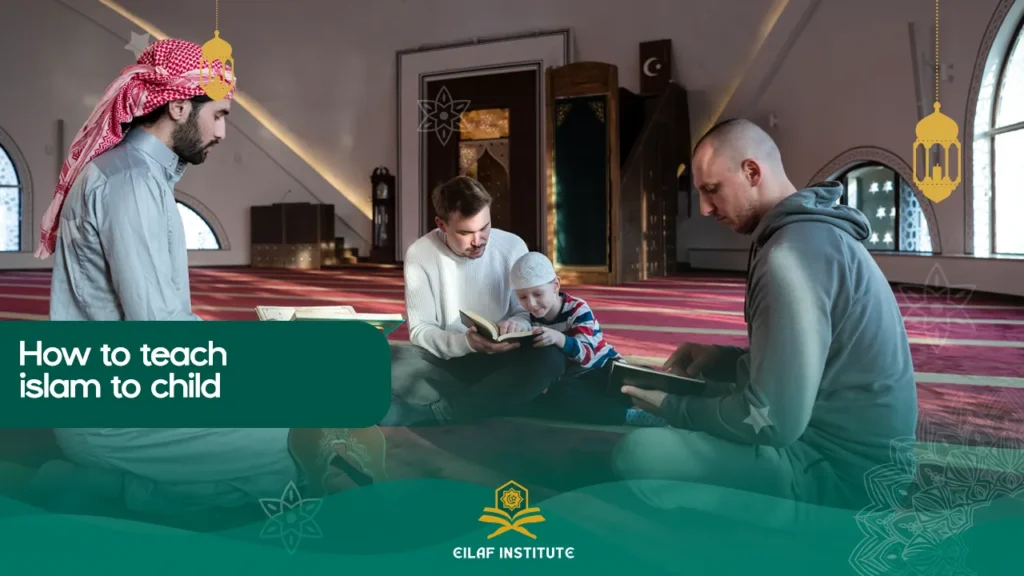Teaching Islam to children is considered one of the foremost priorities for both parents and teachers alike. It is very necessary to guide them in their understanding of faith, imbibing values, and attaining a close relationship with Allah. Children learn, however, in an enjoyable and interactive way. And if the atmosphere is nurturing, the children will appreciate the teachings of Islam rather than just learning about the faith, and the love thus developed will be cherished for a lifetime.
How to Teach Islam to a Child?
These tips will teach parents how to teach Islam to a child.
1- Make learning fun
Children often lose focus quickly during learning sessions. To keep them engaged, incorporate fun and interactive elements into the lessons. This approach not only helps them concentrate on what they are learning but also prevents boredom. By creating an enjoyable learning environment, children can absorb knowledge about the Islamic religion effectively and remain motivated throughout the sessions. This ensures they reach their learning goals while having a positive and enriching experience
2- Tell an Islamic story
Telling stories to children encourages them to listen attentively and increases their daily progress, as children naturally enjoy stories and tend to remember them for a long time. This approach helps parents achieve their goal of teaching their children more about the Islamic religion in an engaging and memorable way.
Read also about : How To Learn Islam Step By Step for adults
3- Build connection with God
Introduce the child to God in a way that suits their understanding and level. Teach them that God is One, without any partner, and explain that He is the Creator of everything, including the earth, sky, humans, animals, trees, rivers, and more. The educator can use real-life situations, such as during an outing in a garden or the wilderness, to ask the child about the Creator of water, rivers, and the surrounding natural phenomena. This can help draw the child’s attention to the greatness of the Creator, Allah Almighty. The child is also directed to realize God’s grace upon him and the blessings of health and wellness that He has bestowed upon him. For example, he is asked: Who gave you hearing, sight, and reason? Who gave you strength and the ability to move? And so on. He is also urged to love God and thank Him for these blessings and grace. Making the child love God and what God loves is a good thing and has educational benefits sooner or later, God willing.
4- Lead by Example
Parents must be strong role models for their children, as children often imitate what they see in their parents. To guide their children effectively, parents should embody the values and teachings of Islam, acting in accordance with the principles of the Holy Quran. This includes demonstrating fairness, engaging in prayer, and living with integrity. By practicing these behaviors consistently, parents can inspire their children to follow the teachings of Islam, instilling in them a deep faith and guiding them to become true believers.
5- Teach the Dua
Teaching children the importance of prayer (dua), explaining why they should perform it daily, and helping them understand its impact on their real lives will greatly assist parents in achieving their goal of raising righteous believers. By instilling in children the significance of turning to Allah, parents help them develop a strong spiritual foundation and a deeper connection to their faith. This practice not only cultivates a sense of gratitude and dependence on Allah but also reinforces values of discipline, devotion, and trust in God’s guidance.
6- Send them to Mosques
The mosque plays a significant role in shaping young individuals, particularly when they are accustomed to visiting with their parents from a young age. It serves as an educational space that preserves values, nurtures talent, and helps build a connection to Allah. The mosque becomes a place where children develop an understanding of right and wrong, reinforced by the positive influence of righteous individuals within the community. Through observation and example, they learn ideals, values, and the importance of righteousness. This environment fosters spiritual growth and builds strong moral foundations in their lives.
Read also about : the Importance Of Islamic Studies
7- Celebrate with them Islamic holidays
Encourage your children to create joyful memories with Islamic holidays by spending quality time with them and celebrating these occasions together. This will help them build a strong connection with Islam and its traditions. Make Islamic holidays special for your kids by celebrating with enthusiasm, organizing activities, telling stories related to these days, and involving your children in the celebrations. This approach will deepen their understanding of Islamic traditions and instill a sense of belonging and happiness in practicing their faith.
8- Design a Reward System
A reward system can be an effective way to motivate children and encourage good behavior. Incentivize Positive Behavior: Create a chart where children can earn stars or tokens for good actions, such as helping others, reciting their duas, or attending prayers. At the end of the week, reward them with a special treat. Positive Reinforcement: Regularly acknowledge and reward their efforts, no matter how small the achievement, to reinforce positive habits. This practice helps children remain engaged in learning and consistently practice Islam.
Eilaf offers a variety of interactive materials that make learning about Islam fun and accessible for children. With resources like engaging Quran lessons, exciting activities, and inspiring Islamic story books, Eilaf ensures your child embarks on an enriching Islamic journey.
Join Eilaf today and let your child explore the beauty of Islam in an enjoyable and educational way!

